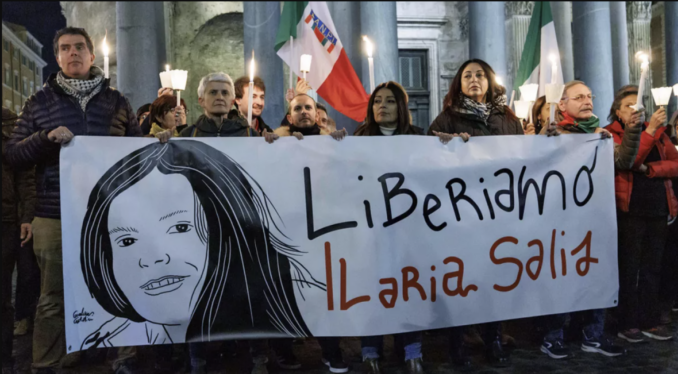Italian anti-fascist freed after international backlash

Rome, May 2024.
Ilaria Salis, a 39-year-old elementary school teacher from northern Italy, went from political prisoner to elected official in just over a year.
The anti-fascist activist was arrested in Budapest, Hungary, last year for allegedly assaulting two neo-Nazis — charges which Salis denies. In addition, Hungarian authorities accused Salis of being “a member of an extreme left-wing organization” which they identified as “ANTIFA.”
The imprisonment of Salis by the far-right government of Viktor Orban came at a time of escalating repression of anti-fascists in the United States. Last month, 11 San Diego activists, who prosecutors argued were part of an “ANTIFA conspiracy,” were convicted on similar grounds for alleged assaults on white supremacist demonstrators. One of the San Diego 11 was sentenced to 10 years in prison. Salis faced 11 years if convicted.
In a jail cell in Hungary, Salis experienced conditions that would also be familiar to anyone ever incarcerated in U.S. prisons. In October of last year, she wrote: “For a total of one month, I have been with another inmate in cells that measure less than seven square meters, excluding the bathroom. You spend twenty three hours out of twenty four in a completely closed cell. Besides the bedbugs, the cells and corridors are full of cockroaches and mice. I found myself without toilet paper, soap and sanitary pads.”
Salis also reported that after discovering a lump in her breast prior to her arrest, she was denied a mammogram and ultrasound for months. “I have not received any written report, which has instead been delivered to the prison doctor, who refuses to hand it over to my lawyer,” she wrote. (Guardian, Jan. 2)
It was this kind of treatment that shocked the conscience of Italians across the political spectrum. In January, Salis was brought before a Hungarian judge bound and shackled by her ankles and wrists. Describing the incident, an attorney for Salis said, “It was shocking; she was dragged like a dog. It was crazy, the Italian state must do something.” (Ansa English, March 28)
Even as the Italian state seeks to forge closer ties with Orban’s Hungary, Foreign Minister Antonio Tajani said in a radio interview, “This time it seems to me it has gone too far.” He later summoned the Hungarian diplomatic delegation to the foreign ministry and negotiated for Salis to be placed under house arrest in Budapest rather than in one of its prison cells. (Ansa English, Jan. 30)
From prisoner to parliamentarian
If this gesture was meant to placate Salis’s supporters, it failed. Rather, Italian anti-fascists rejected the diplomatic compromise between the two far-right governments. Ahead of her trial which was scheduled for May, the Greens and Left Alliance — an electoral coalition of progressive and democratic socialist organizations that formed in 2022 — offered Salis their nomination for the upcoming European Parliamentary elections.
Her subsequent victory this June meant that as an elected European Union parliamentarian, she must be granted diplomatic immunity, a longstanding agreement of international law which prevents foreign governments from prosecuting other country’s diplomatic representatives.
This electoral gambit paid off, and Salis was released from house arrest in Hungary. But egregious violations of centuries-old diplomatic mores have been committed in recent history. In 2020, the U.S. arranged for the illegal arrest and rendition of Venezuelan diplomat Alex Saab who was held until his release last December. In April, Israel murdered 14 members of the Iranian diplomatic delegation in an airstrike targeting that country’s embassy in Damascus, Syria.
In this case, it was not just a legal loophole that won her freedom.
It was the mass pressure of the radical Italian working class that made Salis’s case an international cause celebre, then elected her to office and then kept up the momentum until she walked free.
‘The spirit of anti-fascism today’
The Associazione Nazionale Partigiani d’Italia (National Association of Italian Partisans) was founded in 1944 by Italian resistance fighters as they fought Nazi occupation and the fascist regime under the then-deposed Benito Mussolini. Eighty years later, ANPI still claims over 100,000 members.
On April 25, Italians commemorated the liberation of Italy from Nazi forces in 1945. It is a national holiday that took on newfound meaning after the rise of the neo-fascist Brothers of Italy party under President Georgia Meloni. Marchers chanted “Ilaria will be free!” and demanded Italian officials call for her immediate release.
Salis, in a letter to demonstrators delivered by her father, wrote, “In my homeland, we honor the end of World War II and the expulsion of Nazi fascists, a testament to the valorous efforts of partisan men and women. From my confines, I earnestly hope that my nation upholds its storied legacy. May it continue to confront global injustices and remain steadfast on the right side of history. Happy 25th of April!” (Hungary Today, April 26)
“Ilaria epitomizes the spirit of anti-fascism today,” Roberto Salis said of his daughter.
Following the demonstration, activists accused Meloni’s government of censoring the broadcast of another speaker’s remarks, which detailed the history of Italian complicity in the Holocaust and other Nazi war crimes.
After the elections, in which the Greens and Left Alliance won 6.8% of the seats for Italy’s European Parliamentary delegation, the coalition released a joint statement saying, “Ilaria Salis can now return to Italy and fulfill her new role as indicated by hundreds of thousands of voters.
“Our thanks go to all those who, like us, have been outraged and have not accepted the terrible condition in which she was held in Orbán’s prisons over these months. Now she can defend civil and social rights of the most vulnerable together with us.” (Houston Chronicle, June 14)

